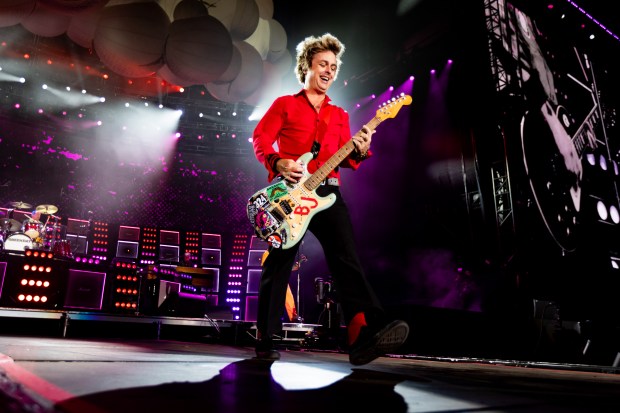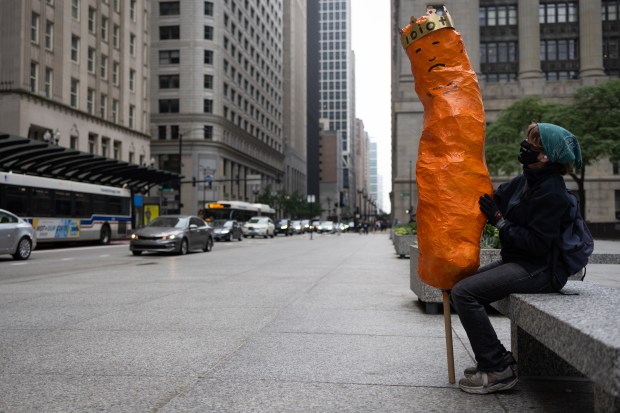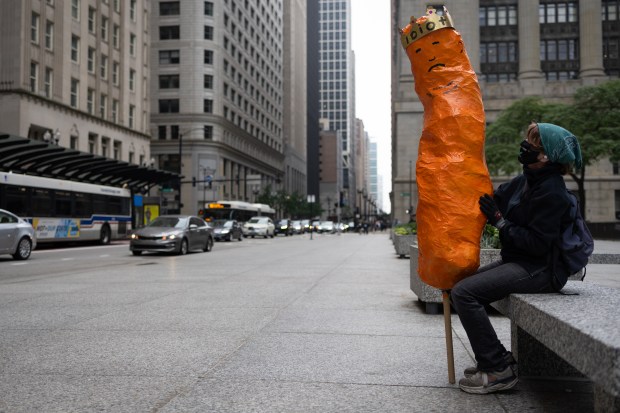So much for burying the lede. “The American dream is killing me” — the first words out of Green Day vocalist-guitarist Billie Joe Armstrong’s mouth Tuesday at a sold-out Wrigley Field — established the theme for almost everything that followed. Anchored by the invigorating performance of two landmark albums in their entirety, the band transcended nostalgia and hit on nearly all cylinders during a 145-minute concert that barely paused for breath.
At heart a commemoration of the 30th anniversary of “Dookie” and 20th anniversary of “American Idiot,” the show functioned as a rallying cry against authoritarianism, prejudice, disinformation and regressive policies. Common targets, all, for punk artists, and Green Day approached them with calls to action and messages that won out for their combination of balance, intelligence and perspective. Cell phones, algorithms and propaganda received a lashing. Ditto warmongers, MAGA and anyone upset by LGBTQ rights.
Rather than frame protest in angry or desperate terms, Green Day turned a majority of moments into celebrations and conveyed an optimism occasionally at odds with the subject matter. The determination, sharpness and swing the collective invested in its playing helped maintain positivity and focus. As did the band’s goal of cramming more than two records’ worth of material into a slot hemmed in by a weekday neighborhood noise ordinance.
However well-intended, the aimless drifting and harmless schtick that the band tends to incorporate into its headlining gigs were thankfully nowhere to be found. Armstrong still over-indulged in recurrent “hey-oh” chants, though not at the risk of losing the thread of any songs. To further connections, he improvised snippets of classics (John Mellencamp’s “Jack and Diane,” Tom Petty’s “Free Fallin’”) as introductions. His bond with the crowd rivaled that of his chemistry with the trio’s other core members — drummer Tré Cool and bassist Mike Dirnt — and underlined his plea for everyone to experience togetherness and joy.
Looking at least a decade younger than his 52-year-old age, Armstrong can be accused of getting soft but not of waning enthusiasm. The singer championed the Midwest, Cheap Trick and the Friendly Confines. He wore a constant smile and sparked with ceaseless energy, whether encouraging audience participation, leaping off platforms or injecting emotion into his deliveries. Aside from a few indications of hoarseness, and absent the throat-scraping snarl of his youth, his phrasing and range remain about the same as they were when “Dookie” helped change the cultural landscape in the mid-’90s.
Green Day spent the better part of the past 20 years attempting to create an equivalent to that record and “American Idiot,” coming closest with “21st Century Breakdown” (2009). A creative decline followed in the early 2010s, after which the band began to claw back some of its losses. Its latest effort, the solid “Saviors,” adheres to a recognizable pattern wherein the group maintains respectability yet falls short of its peak.
That heyday arrived in two waves, with “Dookie” unexpectedly propelling the relatively unknown group to the top of the charts. The then-irreverent trio became poster children for a burgeoning pop-punk scene, which succeeded the waning “grunge” movement as the staple rock music of the era. Cemented by a famous mud-splattered performance at Woodstock ‘94, Green Day’s rise prompted the mainstream emergence of copycat bands, skateboard-influenced fashion and the inaugural Warped Tour in 1995.
Its popularity aside, Green Day’s ambition and growth on “American Idiot” arrived as a shock. Issued a few months before George W. Bush’s re-election, it signaled a dramatic expansion of technique, aptitude and intent. The songs’ overt ties to sociopolitical moods and trends resonated with a public reeling from Sept. 11, oil-fueled conflicts and, in due time, Hurricane Katrina.
“It seems like forever ago,” Armstrong reflected on the climactic “Whatshername,” his tone projecting a reluctant sentimentality that proposed you can never fully divorce yourself from your past. In the context of the evening, the line communicated truths about the decades that elapsed since Green Day made the albums being feted on the stage. The lyric also demanded reconsideration given the adolescence-to-adulthood matters explored on “Dookie” and “American Idiot” remain not only relevant, but more prevalent.
Augmented by three support musicians, Green Day appeared to acknowledge as much in the way it handled “Dookie” and channeled how its meanings evolved. The band tore through the hook-rich tunes with zest and vigor, retaining their sense of fun though accentuating the potential severity of many of the issues addressed in beloved works such as the strolling “Longview,” spastic “Basket Case” and bubblegum-laced “Pulling Teeth.”
Loneliness, apathy, anxiety, longing, impoverishment, bad romance, fantasy vengeance: Once viewed as juvenile problems, and originally sent up in songs by a youthful Green Day with bratty humor and nose-thumbing attitude. They were treated here with a practiced professionalism and thinly veiled seriousness indicative of their pervasiveness in contemporary environments riddled with epidemics of post-panedemic isolation, youth suicide, opioid addiction and gun violence.
Even as Armstrong left his extroverted prankster guise behind for a future visit, some silliness surfaced. The Cool-led confessional “All by Myself,” during which the drummer paraded around in a leopard-spotted robe for exaggerated effect, provided appropriate comedy. Equally lighthearted, “Sassafras Roots” landed as an endearing invitation from one misfit to another to embark on a date.
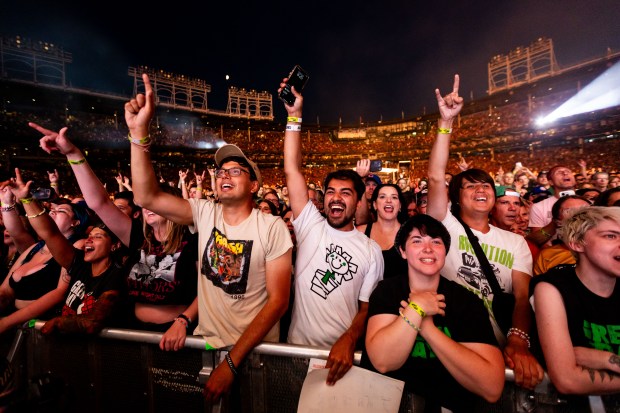
The intensity of the feminist-minded “She,” however, trumpeted dissent and joined the bristling “Know Your Enemy,” folksy “Minority” and multiple “American Idiot” songs in railing against another batch of modern problems: acquiescence, alienation, censorship and hypocrisy. And a wealth of fare from the band’s 2004 LP — the swaying “Holiday,” staggered “Give Me Novacaine” and spring-loaded “She’s a Rebel” included — registered with spiked vitality and critical urgency.
Along with visual candy that extended to a blow-up plane dropping bomb-shaped balloons over the audience, a steady blitz of pyrotechnics — explosions, fireballs, flames, sparks, smoke — responded in kind to the anthemic music. On video screens, Green Day broadcast animated sketches linked to the “Dookie” cover art and replicated the latter imagery and that of “American Idiot” with large inflatable structures at center stage.
Devoid of the band’s passion, it would have all been fancy window dressing. Green Day delighted in achieving its marathon tasks. Responsible for pumping out rapid-fire guitar chords, Armstrong’s elastic right arm evoked rubber sticky-hand toys that slap against hard surfaces and stretch without breaking. Controlling the tension, Dirnt caused bass lines to walk and run, snap and slide, slacken and tighten, or crack like stubborn knuckles. The MVP? Drummer Tré Cool, unflappable behind the kit, surging with stamina and consistency while pounding down the rhythmic rails on which Green Day rode.
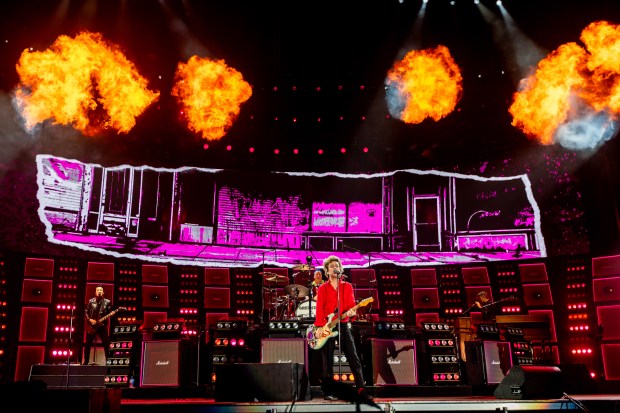
Making their local debut with a revamped lineup completed by new guitarist Kiki Wong, Chicago’s Smashing Pumpkins spent a bulk of its hour-long set on autopilot. Barely recognizable from the band that treated its hometown to a remarkable show right down the street at Metro in late September 2022, it mixed a few recent cuts amid rushed greatest hits and bypassed any material from the LP it released earlier this month.
Understandably, the sextet encountered restrictions associated with an opening slot and dealt with a bass-heavy sound mix that squelched dynamics. Nonetheless, outside of monster drummer Jimmy Chamberlin, leader Billy Corgan and company lacked impetus and inertia. “Bullet with Butterfly Wings” clipped its hallmark rage. “The Everlasting Gaze” stayed stuck in second gear. The inspired guitar architecture, the space-rock excursions, the theatrical gestures? Not tonight, tonight.
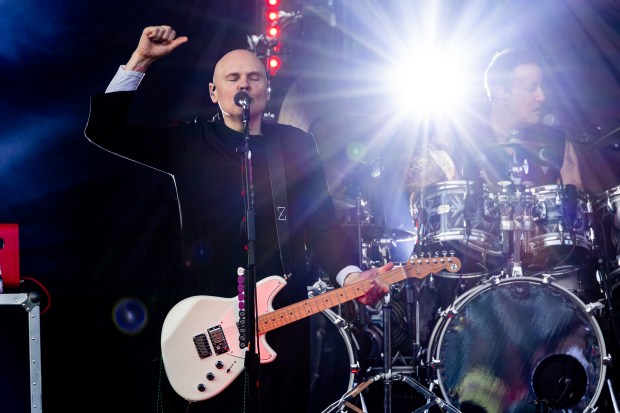
Partially enlivened by Wong, who came ready to rock in a leather-and-studs ensemble that would pass muster in Judas Priest, Corgan picked his spots. He spoke of the band’s 36-year history and practicing at the Cubby Bear. He put an abstract, metal-tinged twist on U2’s “Zoo Station” and leaned into “Cherub Rock.” And he seemed enthused by mixing a perplexing live-wrestling sequence into “Beguiled.”
Too little to cover for the band’s shortcomings, and the fact he spent most of the performance resembling a sour little boy disappointed to learn he couldn’t go to his friend’s house to play. Still in love with his sadness. Perhaps too much so.

Green Day setlist from Wrigley Field Aug. 13:
“The American Dream Is Killing Me”
“Burnout”
“Having a Blast”
“Chump”
“Longview”
“Welcome to Paradise”
“Pulling Teeth”
“Basket Case”
“She”
“Sassafras Roots”
“When I Come Around”
“Coming Clean”
“Emenius Sleepus”
“In the End”
“F.O.D.”
“All by Myself”
“Know Your Enemy”
“Look Ma, No Brains!”
“One Eyed Bastard”
“Dilemma”
“Minority”
“Brain Stew”
“American Idiot”
“Jesus of Suburbia”
“Holiday”
“Boulevard of Broken Dreams”
“Are We the Waiting”
“St. Jimmy”
“Give Me Novacaine”
“She’s a Rebel”
“Extraordinary Girl”
“Letterbomb”
“Wake Me Up When September Ends”
“Homecoming”
“Whatshername”
“Bobby Sox”
“Good Riddance (Time of Your Life)”
Smashing Pumpkins setlist
“The Everlasting Gaze”
“Doomsday Clock”
“Zoo Station” (U2 cover)
“Today”
“That Which Animates the Spirit”
“Tonight, Tonight”
“Ava Adore”
“Disarm”
“Bullet with Butterfly Wings”
“Beguiled”
“1979”
“Jellybelly”
“Cherub Rock”
“Zero”


